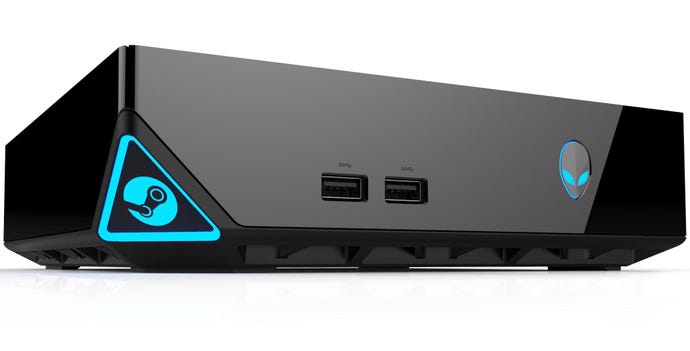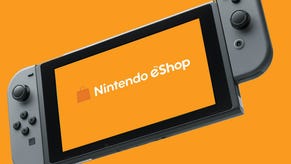Valve Plays the Long Game Again
Eurogamer's Tom Bramwell argues Steam Machines are about protecting the PC, not beating consoles.
This article first appeared on USgamer, a partner publication of VG247. Some content, such as this article, has been migrated to VG247 for posterity after USgamer's closure - but it has not been edited or further vetted by the VG247 team.
So then, we finally have eyes on Steam Machines at CES 2014 in Las Vegas. Unfortunately, those eyes have come away unimpressed.
Valve has announced 13 hardware partners who are making Steam Machines -- PCs using a variety of different components, form factors and pricing models that are united by their use of the Steam licence for marketing, SteamOS as their default operating system and the Steam Controller as their preferred input method.
Steam Machines range from iBuyPower's $499 grey-and-orange set-top box lookalike, featuring components that resemble those in PS4 and Xbox One, all the way up to Falcon Northwest's customisable Titan-powered PC tower, priced from $1,799 to $6,000. There really does seem to be something for everyone.
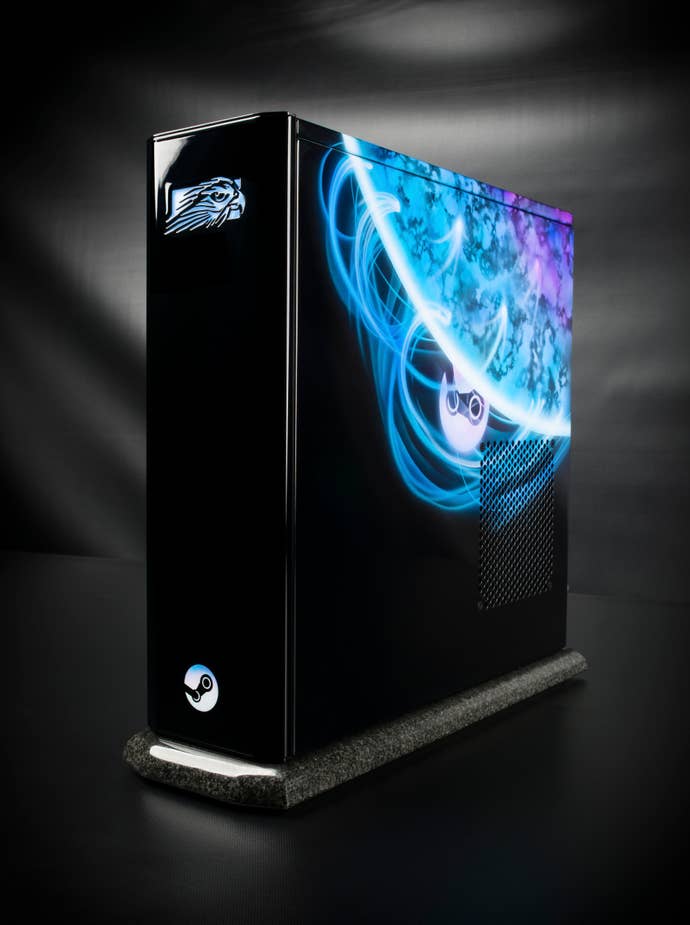
Except the most common complaint is that there is nothing anyone wants.
Steam users and PC gaming fans had been hoping that Steam Machines would pose some sort of threat not only to the duopoly of Sony and Microsoft's next-generation consoles, but also to our wallets. I think we all wanted good, cheap Steam PCs for the living room. Instead, the cheapest Steam Machines are around the same price as an Xbox One in the States, they can't match PlayStation 4's $399, and they lack the other benefits of those systems, particularly exclusive games.
Valve also shows no appetite to play the Sony or Microsoft role. Despite making some of the best PC games in the world (not to mention sitting on the most wanted sequel in the history of first-person shooters), it will not tie any of this in to SteamOS exclusively and shows no interest in buying up third-party content. Valve isn't making its own Steam Machine, either, or subsidising the cost of the others so they can compete with home consoles.
On the surface of it, it's a strange situation. Surely it must be obvious to Valve, a company that can't make it halfway through a sentence without using the word "customer", that this isn't what people were hoping for? Surely it must be obvious that Steam users will be unimpressed by an operating system that doesn't work with 90% of the Steam library? (An option to stream gameplay from your PC to Steam Machines hasn't been implemented yet and sounds less than optimal in any case.)
I share some of this frustration -- for one thing, I'd love a $399 box with next-gen specs that runs all my Steam games and fits under my TV, so it's a shame this is not that -- but I also think I understand why this situation has arisen.
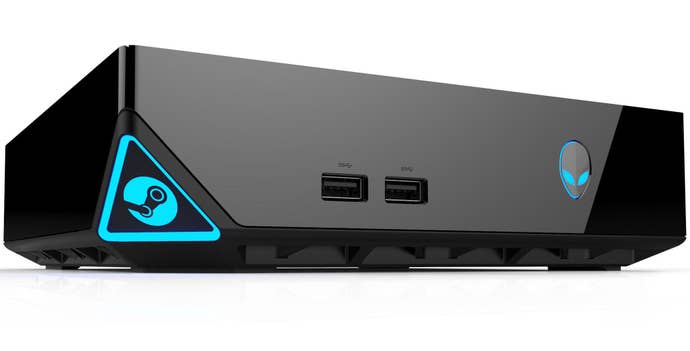
The key to understanding Steam Machines, SteamOS and the Steam Controller is hidden in an unremarkable phrase Gabe Newell tends to use whenever he talks about them. I wasn't in Las Vegas at CES, but I read a couple of live blogs that reported him saying it again: Valve's goal with these things is to protect the openness of the PC as a gaming platform. Over the years, Valve has gone from simply evangelizing the PC platform -- it once flew journalists in from around the world pretty much just to tell them it was great -- to actively protecting it, and what we're seeing now is just the beginning of that push.
Take SteamOS. To you and me, it's a direct interface for Steam based on Linux that currently has poor software support. To Valve, though, it's a first step in levering development, publishing, gameplay and community away from their reliance on Windows and DirectX (and to a lesser extent Mac OS) -- systems that cannot be relied upon in the long term.
You could suggest that this is just Valve trying to assert total control over PC gaming by removing Microsoft from the equation, but I don't think that stands up to scrutiny. Sure, Gabe could grow an evil mustache in 2025 and Steam could go to hell, leaving a lot of people in the lurch, but SteamOS is just a layer on top of Linux, which is free and open source, so surely any existing games could then be liberated to live on outside SteamOS with minor modifications. While still unhelpful, I think developers would prefer that doomsday scenario to waking up one day and discovering that Windows XP games don't work on Windows 7.
The Steam Controller, meanwhile, apart from simply being interesting -- come on, you don't want to try out those weirdo haptic touchpad things? -- is a rallying point for PC developers, who will benefit from a common and reliable interface.
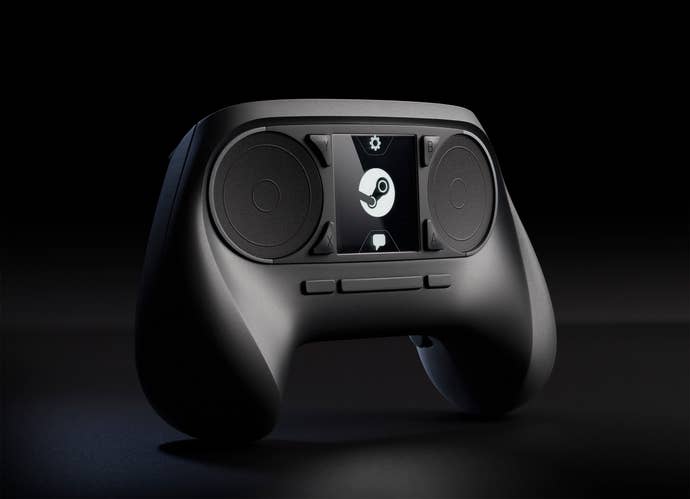
As for Steam Machines, they are a beachhead, not an atom bomb. They are meant to sell modestly. The hardware vendors making them have presumably estimated their return and weighed the risks. They have probably decided that licensing the Steam name and whacking it on a cool bit of bespoke hardware will make them a little money. They're probably right.
One argument I see here and there is that Steam now has a chicken-and-egg problem, but I think this concern is misplaced. How do you get people to make games for SteamOS when no one's bought a Steam Machine? How do you get people to buy Steam Machines when the SteamOS catalogue is so small?
The answer is that Valve is thinking in decades, not console generations. 10 years ago, Steam had one game: Half-Life 2. Today it's the only platform that matters. SteamOS has 300 games, including Valve's own, and they will still work in 10 years' time when PS4 and Xbox One have been consigned to the attic. Like the growth of Steam itself from zero to 65 million accounts, it will be a gradual process.
It can afford to be. None of this week's Steam Machines are going to match PS4's 4.2 million sales in six weeks, but that was never the objective for anyone involved. And all of this stuff may appeal to you and me as consumers to a greater or lesser degree. For Valve, though, that's also fine. Sony and Microsoft are thinking about the next earnings report; Valve is thinking about whether PC gaming is still viable when Valve is dead.
In the meantime, we all have a few more options, which doesn't feel like a bad thing. As Valve spokesperson Anna Sweet put it in conversation with Joystiq at CES: "There are already people like you who already have a PC in their living room, and a lot of those people might run Windows and might just run Steam in Big Picture Mode, and that's a great option. A lot of people want something that's more of a direct-boot experience, so they might take the PC they already have and install SteamOS on it. That's a great option. And a lot of people want to buy a new, dedicated living room machine that's sort of a nicer form factor for putting on a shelf in your living room. We kind of want to give customers those choices and let them experience Steam the way they want to in their living room."
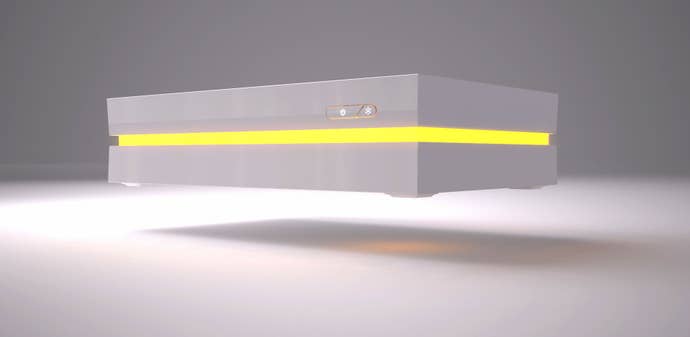
I do have one criticism of Valve in all of this: I don't think it has done enough to manage people's expectations. The point it has made gently -- that this is about protecting the openness of the PC as a gaming platform long-term -- has been too easily overshadowed by the more exciting and glamorous narrative of Valve vs. next-gen consoles. The result is a lot of people who were always going to be slightly disappointed by this week's revelations.
Part of this is our own fault, of course, but then we can hardly be blamed for seeing the world through this lens after 12 months watching two monolithic game consoles battle for supremacy, hyping themselves into a frenzy before exploding onto the market to the tune of millions of sales, the entire future of the home console market apparently hinging on their success or failure.
I am not a public relations expert, but there must have been a way for Valve to prevent people lumping its plans in with all of that. Instead, we ended up with speculative stories like Bloomberg's "PC games king seeks to dethrone Sony, Microsoft consoles", where "Doug Lombardi, a Valve spokesman, declined to comment." Just say it ain't so, Doug!
Valve's announcements were always going to lack that console shock and awe. Now the dust has settled, though, I see that as a plus. While PS4 and Xbox One battle to justify their very existence, these first steps from Valve are a reminder that PC gaming doesn't need to play the same high-stakes games as the noisy console neighbours in order to flourish.
More importantly, as SteamOS, Steam Machines and the Steam Controller gently pick up pace, it will increasingly be able to do so on its own terms.
